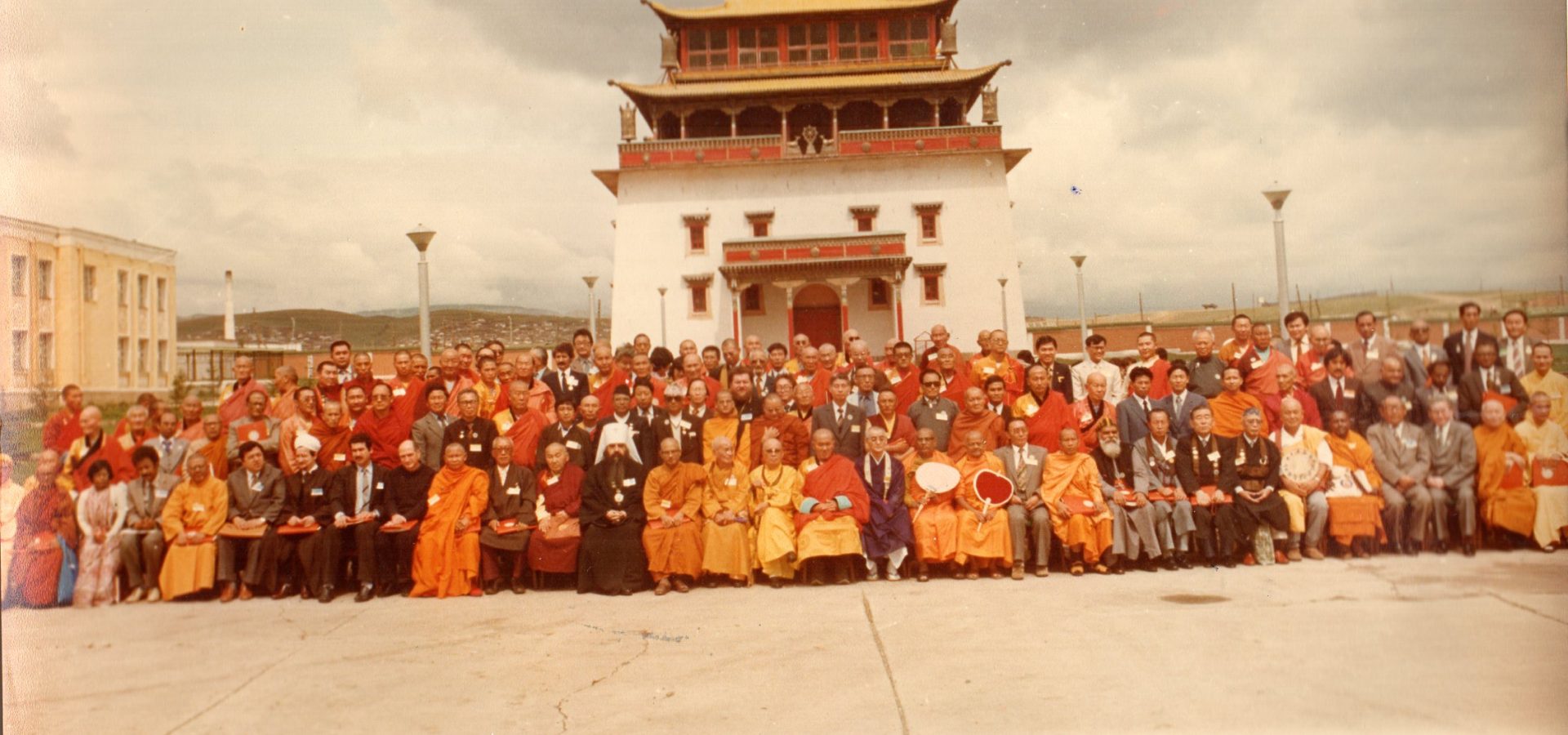SIXTH ABCP GENERAL CONFERENCE
The Sixth ABCP General Conference was held in Ulaanbaatar, Mongolia on 16-18 August, 1982. It discussed the tasks of peace-loving Buddhists of Asia in their efforts for peace and disarmament.
Representatives of 15 ABCP National Centers attended the General Conference and there were representatives of such authoritative international organization as the United Nations, World Peace Council, the Women’s International Democratic Federation, the World Federation of Democratic Youth, the International organizations of Journalist as well as observers from Afghanistan, Bhutan, Hong Kong and the United States, a total of 250 participants representing 19 countries and 12 international and national organizations attended the Sixth ABCP General Conference.
State and government heads of Mongolia, USSR, Socialist Republic of Vietnam, Lao People’s Democratic Republic, Council of the National Edification and Defense of Kampuchea sent messages of greetings to the Sixth ABCP General Conference.
The General Conference was greeted by Most Ven. Khambo Lama Kh. Gaadan, the Head of Mongolian Buddhists and Chairman of the National Preparatory Committee of the Sixth ABCP General Conference.
Kh Gaadan, the Khambo Lama of the Gandan Tegchenling Monastery, was elected the Third President of ABCP. The first session of the Ececutive Council of ABCP elected Most Ven. Thich Minh Chau, Vietna, Most Ven. Shojun Mibu, Japan, and Most Ven. Kushok Bakula Rinpoche, India as Vice Presidents of ABCP and Dr. Prof. Ch. Jugder as the ABCP Secretary General.
The Sixth ABCP General Conference adopted Statement condemning Israeli aggression against Lebanon. It also adopted the Ulan Bator Appeal to Buddhists and all peoples, and also a General resolution on ABCP activities.
The Sixth ABCP General Conference on 17 August 1982 adopted the amended Constitution of the Asian Buddhists Conference for Peace consisting of a Preamble, 10 Articles, which spelled out the aims and objectives of ABCP, its membership, the rights and duties of ABCP members, ABCP bodies, such as the General Conference, Executive Council, National Centers, International Secretariat, ABCP Publication, ABCP Office Bearers, including President, Vice Presidents, Secretary General, ABCP elections, Finances, the seat of the ABCP headquarters, emblem and flag of ABCP, the official language of ABCP.
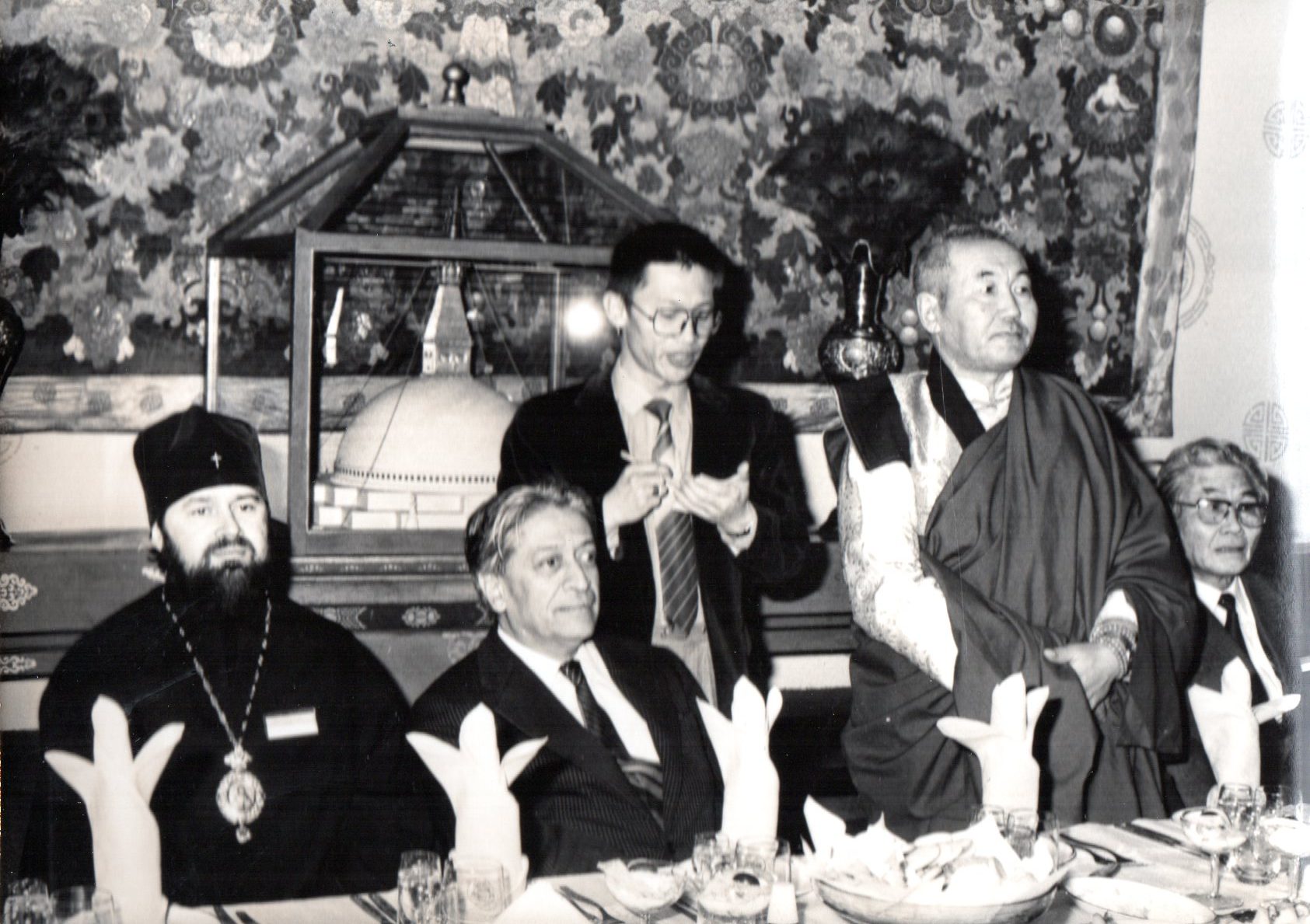
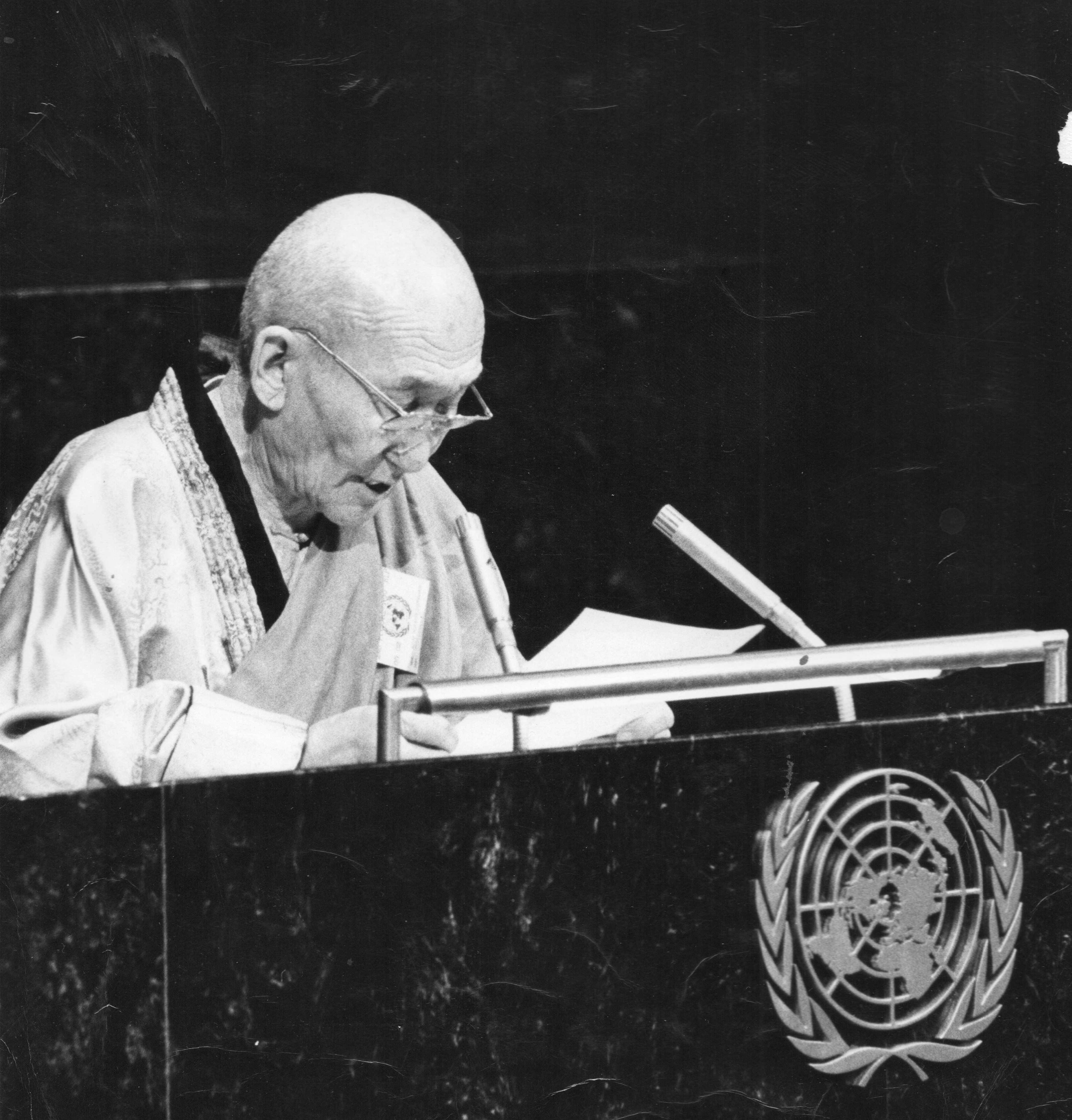
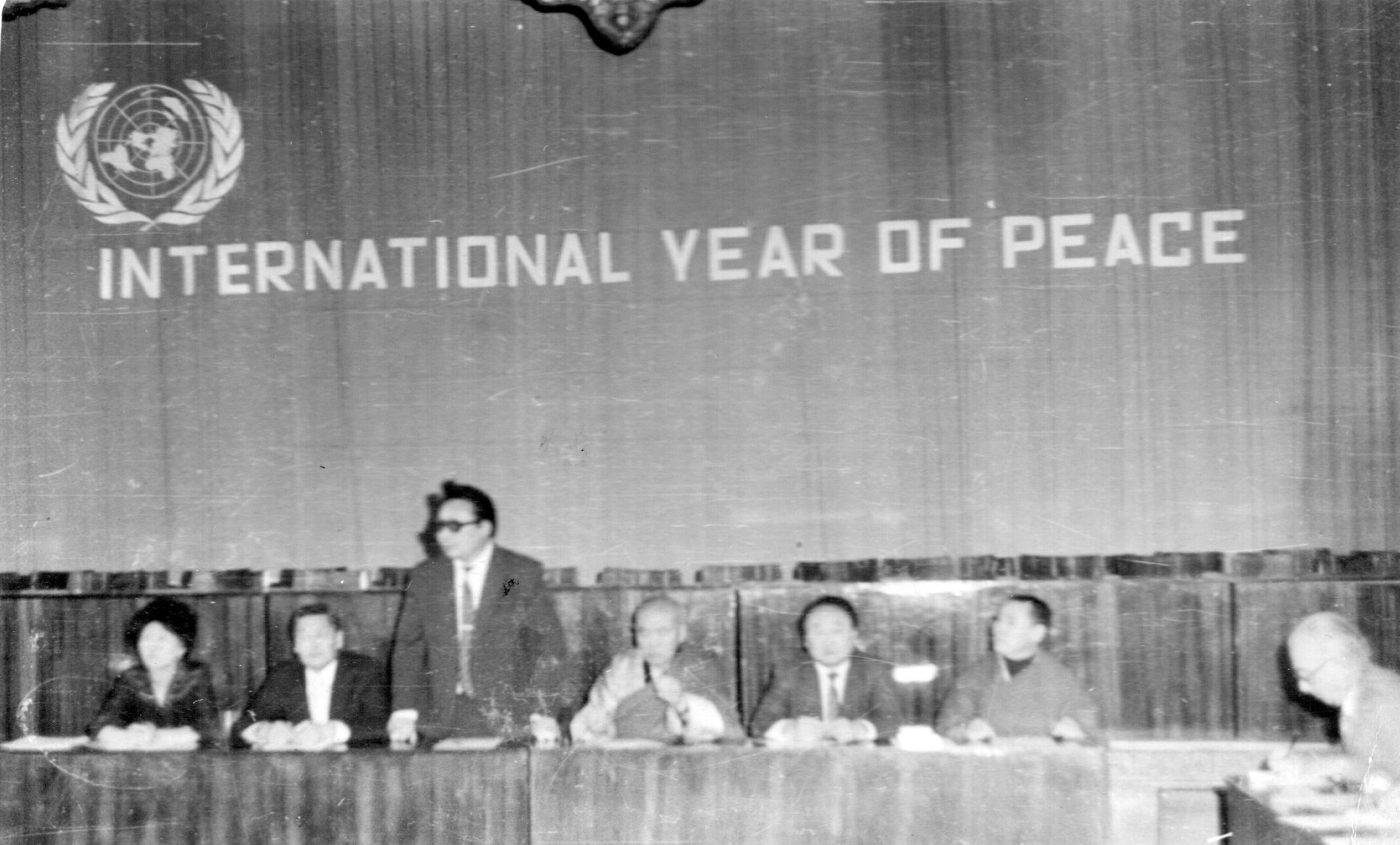
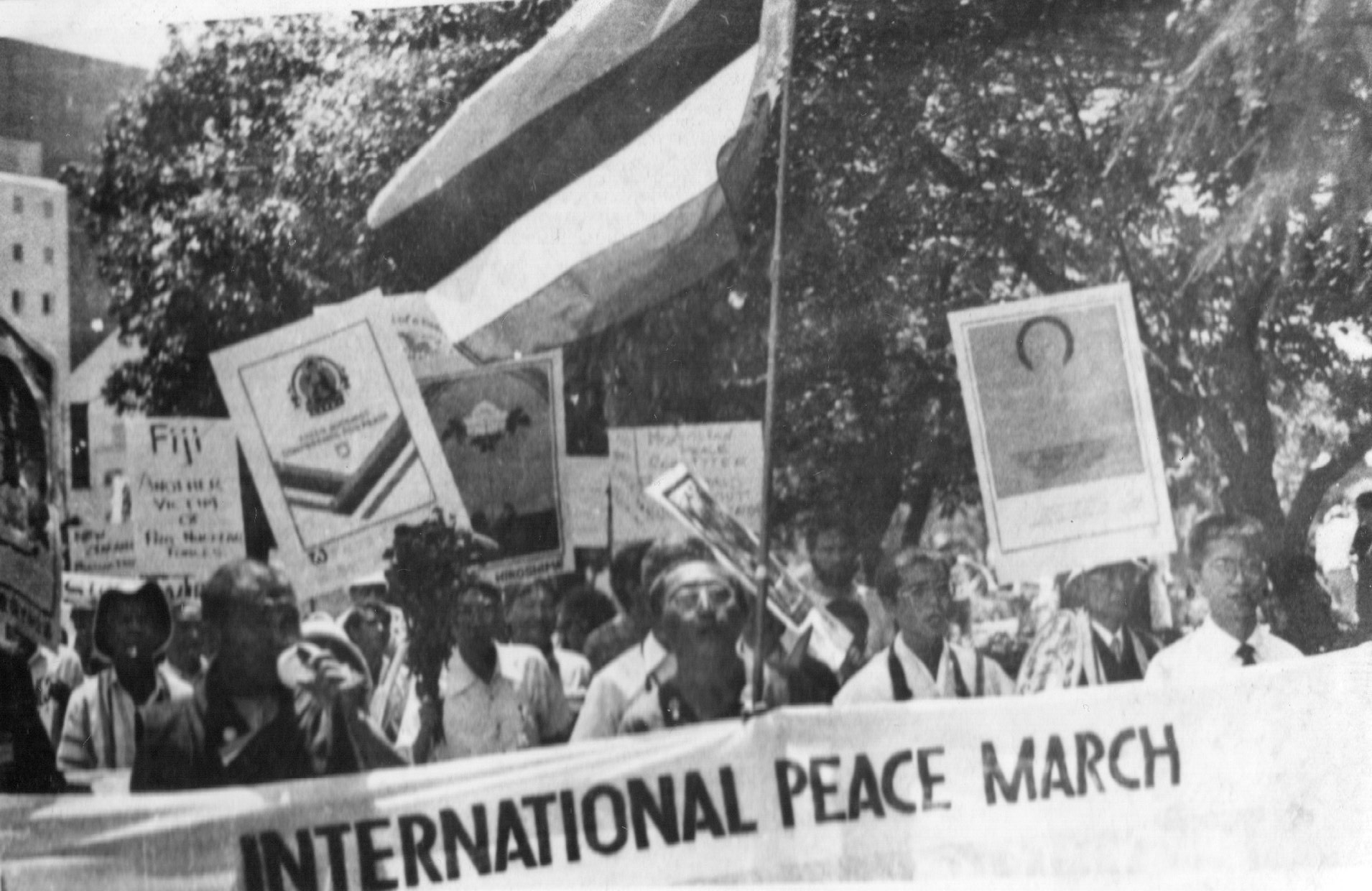
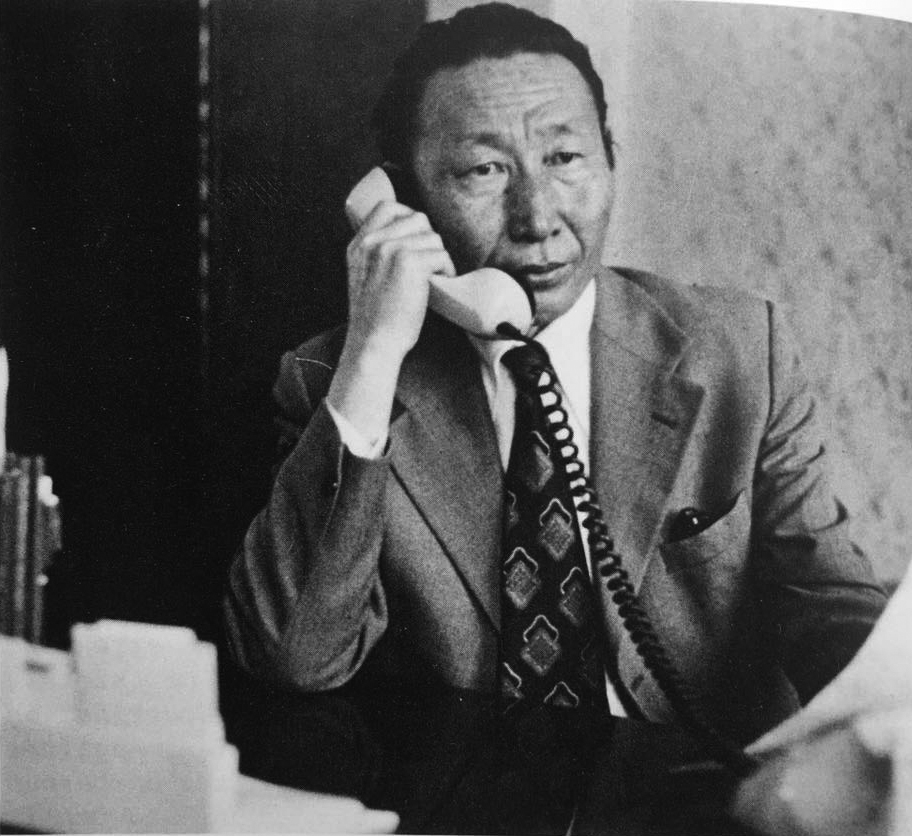
Resolution of The ABCP Sixth General Conference
The early eighties have been marked by a sharp aggravation of the international situation, an intensification of confrontation in the world and the escalation of the threat of a global nuclear catastrophe. We are witnessing open encroachments on the Helsinki Accords and the achievements of the policy of detente.
The threat of nuclear war emanates from the policies alien and hostile to peace, pursued by the aggressive imperialist and reactionary forces. They proclaim “permissibility of a limited nuclear war” in particular, and seek to force upon mankind their doctrine of “acceptability” of a nuclear conflict in general.
The policy adopted by the United States and backed by some of its NATO allies and the expansionist forces in Asia is designed to gain military supremacy, owing to which the unbridled arms race is leading to serious complications in the world. In spite of the enormous arsenals of armaments with colossal destructive potential already stockpiled, the arms race continues to spiral, and people with horror learn about new and more sophisticated weapons of mass destruction being developed.
The present-day sharp deterioration of the international situation, which threatens the very existence of mankind, causes increasing concern and alarm among the nations over the destinies of peace. A convincing indication of this is the unprecedented upsurge in the anti-war movement across the world, which has drawn into its ranks millions of people with different political views and convictions. The development of this movement has been actively supported by representatives of virtually all religions and creeds, including the Buddhists, the Russian Orthodox, the Roman Catholic and other churches.
The peace-loving Buddhists are especially alarmed over the continuing aggravation of the situation in Asia, the spread of local and regional conflicts, the increasing military presence and the stepping up of hostile actions by imperialist and hegemonist quarters, with the United States playing the leading role in all this. All this not only contravenes the cause of freedom, independence and sovereignty of the countries and peoples in this continent, but also puts in jeopardy peace, stability and security in Asia. This highly alarming development of events in the continent makes it urgently necessary to ensure and step up the unity of action and to coordinate efforts by all peace crusaders to thwart the adventuristic and aggressive intrigues of the enemies of peace.
The General Conference, mindful of the lofty duties of the Buddhists to safeguard the sacred right of life as preached by the Lord Buddha, notes with satisfaction the ever-increasing prestige of the ABCP and its impact on public opinion in the Asian countries.
Over the period since the 5th General Conference, the peace movement of Asian Buddhists has further increased in scope, drawing in ever more followers of Buddha, who are united first and foremost by their concern for peace and calm whatever the differences in their political views and convictions. The ABCP has increasingly contributed to the fight for expanding detente, the fight against the arms race and the growing threat of nuclear war. In recent years, the ABCP National Centers have noticeably stepped up their actions in defense of peace.
The ABCP Standing Commission on Disarmament, on Dissemination of Panchsheel principles and on Peace Education, set up after the last conference, are actively involved in the implementation of major and important tasks the movement is faced with in the present situation in Asia and the world over.
The ABCP press organs, especially the journal “Buddhists for Peace” circulated in more than 100 countries, play an important role in realizing the decisions of the ABCP fora, providing publicity for the movement, raising its prestige and influence on the international arena, expanding its ties and contacts with other peace organizations and movements.
The contacts and cooperation of the ABCP with other peace organizations and movements have been constantly growing. The proof of this is the participation of the ABCP in major international fora and undertakings on peace and disarmament, such as the UN General Assembly First and Second Special Sessions on Disarmament, the World Parliament of Peoples of Peace, the World Assembly of Religious Workers for Universal and Nuclear Disarmament, the International Conference “Religious Leaders for Salvation of the Sacred Gift of Life from Nuclear Catastrophe”, the sessions of the Geneva Special Committee of NGO on disarmament and its mass campaigns, the UN regional conferences on Apartheid held in the Philippines, and many others.
In conformity with its constitutional goals and objectives the ABCP and its National Centers pay great attention to active participation of Buddhists in the life of their own countries and in the solution of socio-economic problems that they face.
Loyal to the Buddhist ideals of justice and benevolence, the ABCP redoubles its efforts to promote in every way the realization of the aspirations of the peoples of Asia and other continents for a new equitable economic order, for human dignity and human rights, for freedom, independence and national sovereignty.
In its activities in the coming years, the ABCP will:
- take an active part in the UN sponsored measures to promote peace, friendship and disarmament, and to render every support to the UN Economic and Social Council, UNESCO and other UN organizations;
- come out for an immediate end to the aggressive and expansionist actions by the US-backed Zionist circles of Israel against Lebanon, the Palestinians and other Arab countries and peoples. The Asian Buddhist movement for peace expresses its full support for the well-known proposal for convening an international conference to settle the Middle East problem with the participation of all interested parties, including the PLO as the sole legitimate representative of the Arab people of Palestine;
- fully support the constructive initiatives set forth by Vietnam, Laos and Kampuchea for the attainment of durable peace, stability and good-neighborly relations between the states of South-East Asia and demand an immediate end to the military provocations and subversive actions against the peoples of Indo-China;
- support the striving of broad strata of the population of the Korean Peninsula to reunite Korea on a peaceful and democratic basis and achieve the withdrawal of all US troops from the Southern part of the Korean Peninsula;
- support the proposals on confidence-building measures and on concluding a convention on non-aggression and non-use of force in relations among the Asian and Pacific states, imbued with the concern for peace and security of nations;
- support in every possible way, the decision of the UN World Conference held in Sri Lanka on making the Indian Ocean a zone of peace, the demands of the peoples and states of the Indian Ocean basin and of the world public to prevent the turning of the Diego Garcia Island into a strategic military base of American imperialism intended for suppressing the sovereignty and independence development of the countries of the region, and come out in favor of returning this island to its indigenous population;
- resolutely oppose the setting up of US and NATO military bases and strongholds in the Persian Gulf, on the East African coasts and in other parts of the world, and support the aspirations of nations of these regions to turn them into zones of peace;
- invariably support the anti-imperialist struggle of the peoples of the non-aligned countries, and their efforts to consolidate their independence and sovereignty and ensure socio-economic progress of their respective countries.
The 6th ABCP General Conference considers it its top priority:
- to promote and enhance the anti-war movement in Asia and the world over and in the light of this goal, deems it necessary to work for the implementation of the following aims:
- the general and complete ban on nuclear weapons tests;
- prevention of further proliferation of nuclear weapons;
- establishment of nuclear-free zones;
- elaboration, adoption and gradual implementation of a nuclear disarmament program;
- limitation and reduction of strategic arms, including nuclear arms;
- a ban on deployment of all types of weapons in the outer space;
- a ban on and liquidation of the chemical weapons;
- limitation and reduction of conventional armaments and armed forces;
- conclusion of an international treaty on non-use of force in international relations;
- use of the benefits of disarmament for the purposes of economic and social development.
2. to mobilize the efforts of Buddhists in propagating and implementing the decisions of the First and Second Sessions of the UN General Assembly, the World Peace Council, the World Assembly of Religious Workers and other fora dealing with vital issues of lasting peace in Asia and the world over;
3. to pay particular attention to the expansion, consolidation and intensification of the activities of the ABCP National Centers and their ever broader cooperation with religious and secular organization within their respective countries, favoring peace and friendship among nations;
4. to render all-round support to the actions initiated by the standing commissions and national centers of the ABCP at the international, regional and national levels;
5. to broadly participate in the peace actions organized by international non-governmental organizations to promote disarmament, cessation of the arms race and prevention of the danger of war, and in the preparation and holding of the World Assembly to prevent Nuclear War and Preserve Peace and Life on Earth, scheduled by the World Peace Council for June 1983;
6. to consider its pertinent to convene, jointly with other non-governmental organizations, and international conference on key issues of peace and security in Asia;
7. to keep up the work to study and propagate the Lord Buddha’s teachings on peace and tranquility;
8. to step up the activities of the ABCP National Centers and commissions in advertising and distributing the journal Buddhists for Peace and other peace organs of the movement;
9. to undertake practical measures to broaden the Buddhist movement for peace, and to further peace education of women and youth;
10. to mark annually in an orderly manner the international days and weeks of solidarity, such as the Disarmament Week, Asia Week and others;
11. to work out a detailed program of action of the ABCP for the coming period and to submit it for endorsement to the Executive Council at its next session.
May Lord Buddha bless our peace deeds!
-o0o-
ULAN BATOR APPEAL
Dear friends in the Dharma,
We, participants in the Sixth General Conference of ABCP, representing Buddhist communities in the countries of Asia,
- deeply concerned over the serious aggravation of the situation on the continent and the world over,
- expressing our profound anxiety over peace and tranquility, which has been jeopardized by the growing threat of nuclear catastrophe,
- being sincerely convinced that the salvation of the human civilization and all sentient beings on Earth can be secured only by curbing the reckless arms race, first and foremost, thermo-nuclear weapons, by taking concrete steps towards disarmament,
APPEAL TO ALL BUDDHISTS AND ALL PEOPLES:
- To step up the movement against the danger of war and the arms race, and, to work for disarmament so as to safeguard the sacred right of peoples to a peaceful and happy life;
- To mobilize public opinion in support of initiatives and proposals put forward by the states aiming at ensuring peace and security, consolidating the atmosphere of trust, good-neighborliness and mutual understanding, banning the use and threat of force in relations among nations of Asia and the world at large;
- Welcoming the Soviet Union’s commitment not to be the first to use nuclear weapons and to ensure public support to the demand for similar commitment from other nuclear powers;
- To strongly oppose imperialist forces and their supporters in Asia and to strive to dismantling of the existing and preventing the setting up of new military bases and alliances, which serve as instruments of policies to undermine the sovereignty and independence of nations;
- To expose the root causes of the increasing danger of nuclear war, the arms race and the aggravation of tensions; and to emphasize the need for preserving and consolidating the process of détente;
- To cooperate and render every possible assistance and support to peace-making actions and campaigns against the arms race and for peace and disarmament, sponsored by national and international organizations, and religious and nonreligious anti-war mass movements;
- To initiate and actively participate in peace-making mass actions, such as peace marches, manifestations, meetings, gatherings, seminars, symposia, petition campaigns, etc., at the national, regional, and international levels;
- To render support for the realization of the aims and objectives of the ABCP, the activities of its National Centers and Commissions on Disarmament, Panchsheel and Peace Education.
Reason is a remarkable man is endowed with. It is an immeasurable treasure and an invincible weapon. We believe that no weapon is str0nger than the power of man’s reason. Right-mindedness is inclined to goodness and peace, while wrong-mindedness leads to evil and war. We are convinced that man alone can solve the problems of this world saturated with deadly weapons.
May the teachings of the Enlightened One on peace and tranquility triumph in the thoughts and hearts of all peoples!
Ulan Bator,
18 August 1982.

